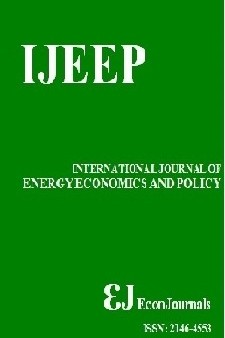Sustainable Economic Growth: An Empirical Study for the Asia-Pacific Economic Cooperation Forum
Sustainable Economic Growth: An Empirical Study for the Asia-Pacific Economic Cooperation Forum
Environmental Kuznets curve, CO2 emissions economic growth.,
- Başlangıç: 2011
- Yayıncı: İlhan ÖZTÜRK
Rodolfo Garcia Sierra, Alvaro Zerda Sarmiento
The Effects of Electricity Consumption on Agriculture, Service and Manufacturing Sectors in Malaysia
Tan Lee Pei, Mohd Shahidan Shaari, Tunku Salha Tunku Ahmad
Elasticity of Agricultural Prices in Russia: An Empirical Study of Energy and Monetary Channels
The Convergence Behavior of CO2 Emissions in Seven Regions under Multiple Structural Breaks
Sakiru Adebola SOLARİN, Muhammad SHAHBAZ, Syed Jawad Hussain SHAHZAD
Wajahat Ali, Azrai Abdullah, Muhammad Azam
Muji SETİYO, Sudjito SOEPARMAN, Nurkholis HAMİDİ, Slamet WAHYUDİ
Barriers to Energy Saving for Public Middle Schools in Bangkok: From School Management Perspective
Wuttipan KİATRUANGKRAİ, Ekachai LEELARASMEE
Economic Evaluation of Nigerian Marginal Oil and Gas Field using Financial Simulation Analysis
